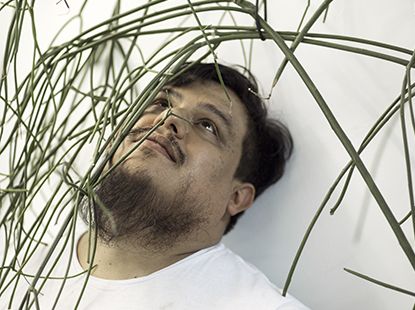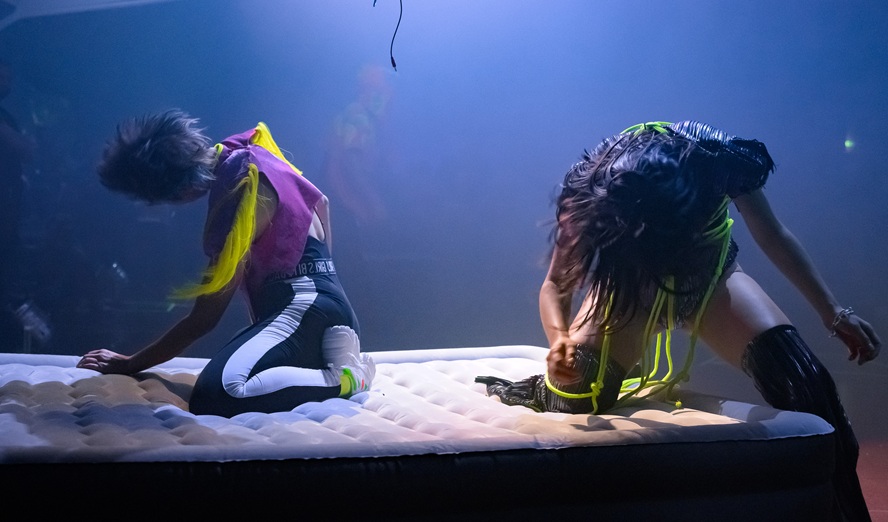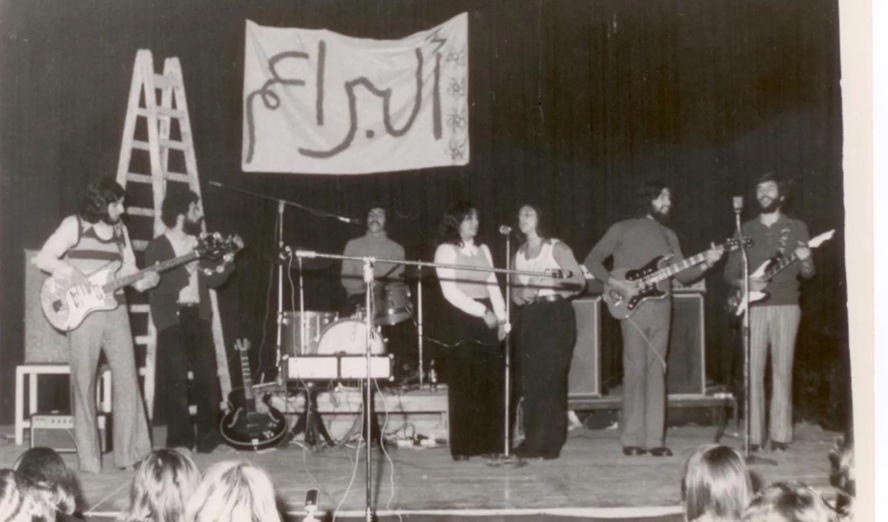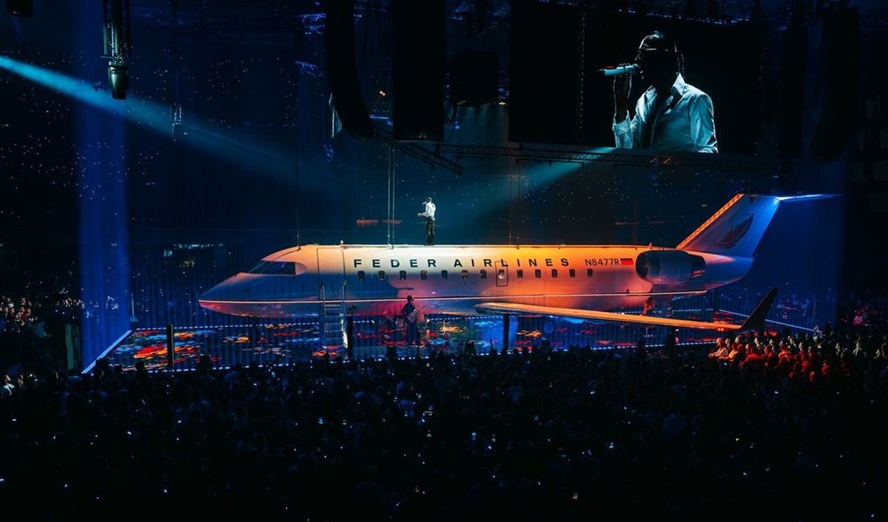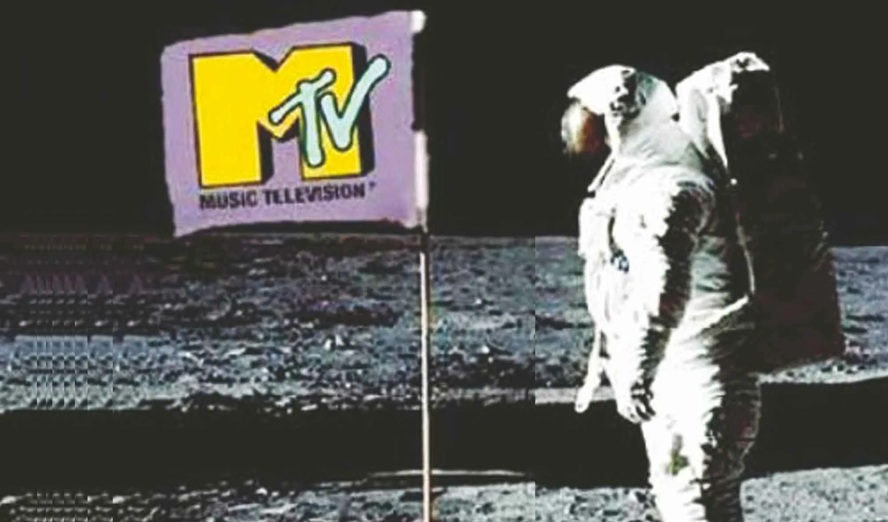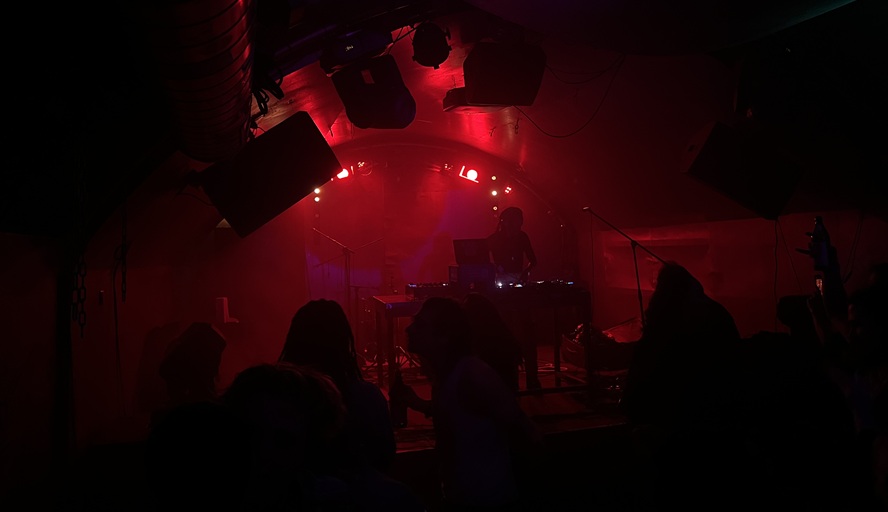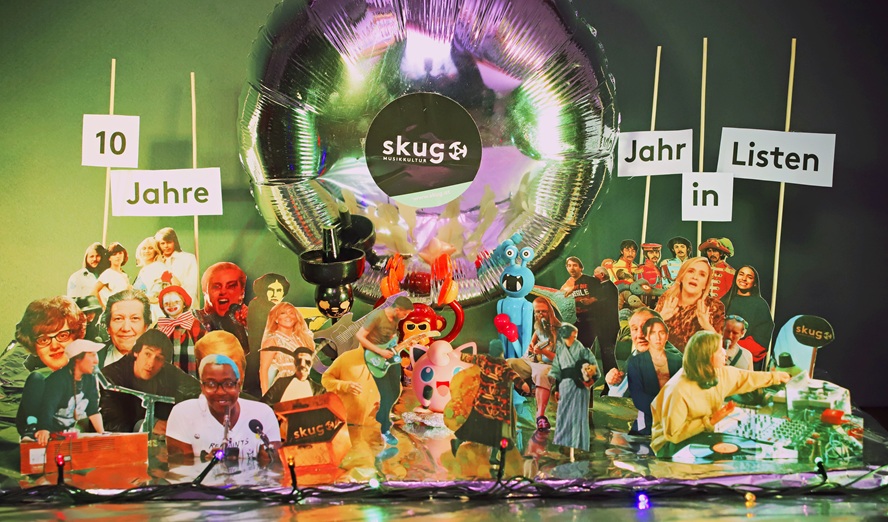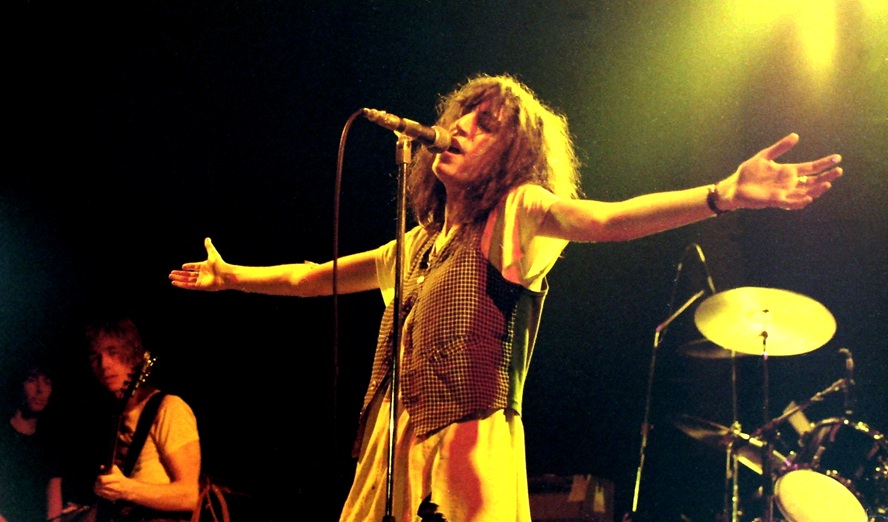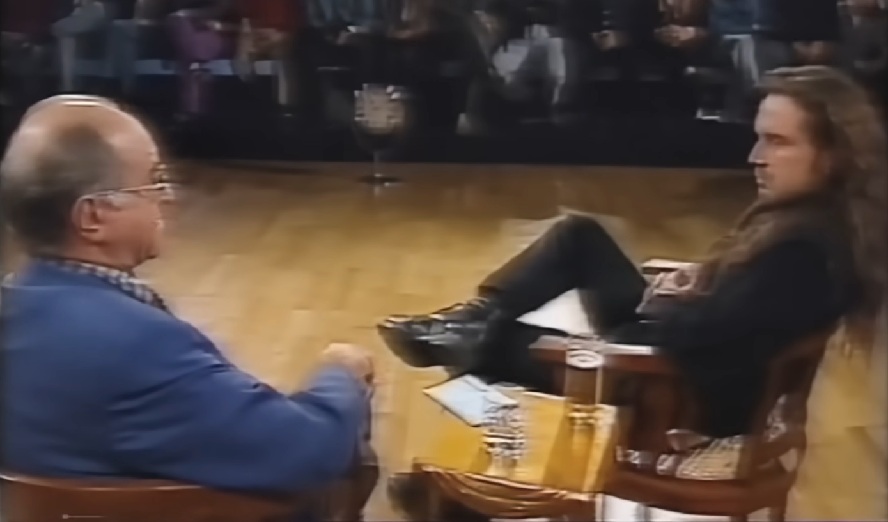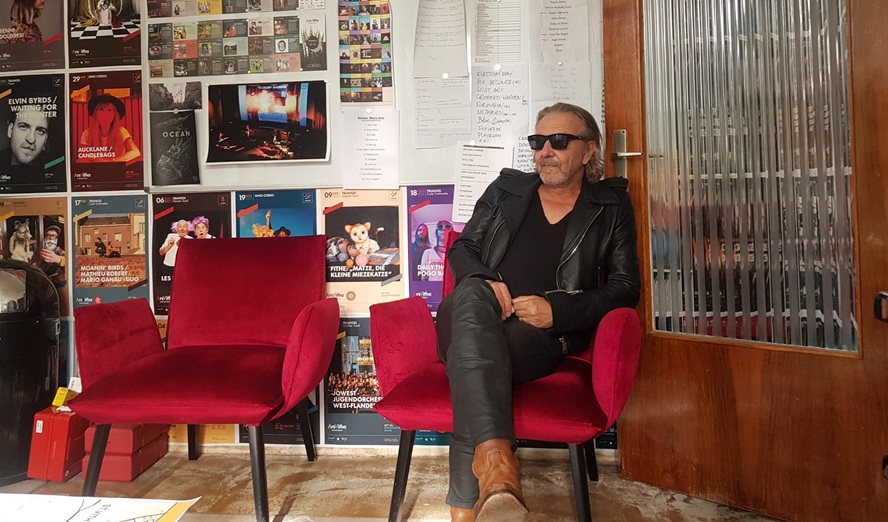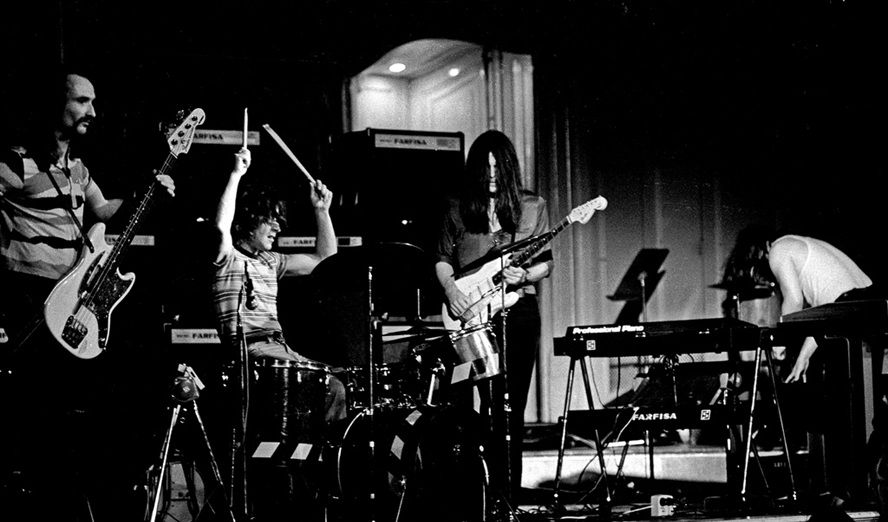skug: How important is the context in which you perform?
Dorian Wood: It is actually very important. I feel that I obviously composed these songs form a very personal perspective, being from and living in Los Angeles. The performative aspect of what I do is geared more toward the audience and the region, culture and language. We are touring through nine countries. It is an opportunity with each day to be able to share with each audience different experiences, and each moment becomes very unique to that evening. It is very exciting to see and hear how the audience reacts. It is very much a shared experience.
Is there a difference between performing indoors and outdoors? How important is the number of people who watch a performance?
A lot of it has to do with the physical setting itself. The performance certainly changes, not drastically in some ways, but I feel that it is also a factor how the sound travels in the space and how the audience reacts to the sound. I personally do have a preference for more intimate spaces simply because I feel that there is obviously a closer proximity, physically, to the audience but I also feel that the separation between audience and performer is less drastic and pronounced. I always prefer to play on the same level. The audience and the performer are on the same level. That way it becomes more intense and intimate and hopefully something more personal for everyone.
What is the most challenging part of working with a lot of musicians, a choir or with your Rattle Rattle Chamber Orchestra, for instance?
In the recording process of the album »Rattle Rattle« it was very much the scheduling of everyone. As far as the performance goes, what is challenging for me is not being able to fully focus on my own performance, because I am constantly thinking about everything else. So usually at the middle of a performance I abandon the idea of controlling fully what is going on around me. But it is definitely a challenge and I love challenges for they are invigorating.
How would you describe your roots in performance?
I have been performing in one way or another since I was a child – mostly in school plays and later in actual theater productions – and then felt that there was something that attracted me more towards the interpretation of music. However, from that point on I felt there was a theatrical element that I was missing. Exploring that, I found that I had to overcome a lot of my inhibitions physically and I started exploring that and I ended up going in a drastic direction with a lot of nude performances and from that point on integrating it with what was more familiar with me, the music. The combination of the two is still something that is happening. It is still a very exciting thing and I don’t think I have reached the point where I know exactly what I am doing. It is a constant process of experimentation. Pushing myself more and more.
Therefore we prepared this question: If you had to choose three elements for a performance what would you choose?
Only three elements? I would say: my body, my voice and my ears. I don’t think I would need my eyes.
How important is it for you to control things? For example, you also directed your video »La Cara Infinita«?
Every project is different of course. The video for the song »La Cara Infinita« is something that I wanted to pursue on my own as far as directing is concerned. In the past I have worked with many directors and for the most part I have been very happy with what they have created. You need to have faith in someone to be able to carry forth a cohesive marriage of vision and sound for you. It is not always successful, but fortunately for me many times it has been. With »La Cara Infinita« I had something very specific in mind that I thought I could probably carry out best if I directed it. Usually it varies from situation to situation and what inspiration can conjure up.
Could you tell us something about the story behind »La Cara Infinita« and how this whole idea for the video setting occurred to you?
The song itself is an ode to women. Almost a battle cry for women to inspire them to free themselves from the oppressions that society may bring upon them. I see firsthand in society the way women are objectified. To me it is a very sensitive subject. I have been around women all my life. I was brought up by women. As a gay man I really respect women enormously. I wanted to create this song in Spanish, because I feel that it is a language I am still exploring and there is certainly a lot of oppression for women in Spanish speaking countries. So it was a way to communicate something very dramatic in the lyrics. The way I translated it in the video was by taking that idea and being inspired also by a Marina Abramovic piece I participated in and in which nude women where placed on rotating tables. It was for a big fund-raising gala in a museum. Marina Abramovic wanted to introduce nude men as well, but the museum director Jeffrey Deitch did not allow it, because he thought nude men would make businessmen feel uncomfortable. I was horrified that it was so casually said. As if using nude women would make them less uncomfortable. This objectification in a modern art museum was absolutely horrifying to me. There was a lot of controversy surrounding that issue. So I created this video in response to that. The video is also dedicated to »j. deitch« – Jeffrey Deitch, who was the head of MOCA, the Museum of Contemporary Art, Los Angeles, at that time. My video shows a scenario where nude men are exploited. There are nude women present but they are almost like otherworldly beings who hold a very silent and strong presence in a room that is somehow chaotic. And meanwhile you have these two men that are very visible, you can see their faces, and they are degraded. It is turning the tables and recontextualizing the topic of objectification. I wanted to make that statement and it was very interesting to hear people’s reactions to that. The participants were wonderful to work with and very understanding as well.
How familiar are you with Spanish culture? And where does this interest in Bulgarian culture come from?
Bulgarian culture was very prevalent on my first album »Bolka«. A big component was that at that time I was with a Bulgarian man. The album itself was something that came about after we broke up. So while we were together, he did expose me to a lot of Bulgarian culture, which he himself did not like at all. But I was fascinated by it. It was new and fresh to me, so I did explore that. And the Spanish culture is very much part of who I am. It has not been until recently that I have decided to explore it more on a creative level. I am currently doing that with the new material I am working on. It is certainly the experience of touring through Europe now, and we did ten gigs in Spain and it was absolutely mind-blowing and so fulfilling. It was a way of practicing my Spanish a lot more, which I don’t get to do very often in the United States. I always have this desire to absorb and share the culture. Certainly being in Spain for so long was definitely a big help.
Which artists inspired you most?
Nina Simone and Scott Walker, as far as they have carried out their visions, have been large influences on me. I am consistently influenced by humanity. A lot of the works that I create are based on my surroundings. I try to find inspiration in human beings around me. A conversation that I overhear or and an event will trigger something. I don’t feel I have a lot of control over that.
And influences from performance art?
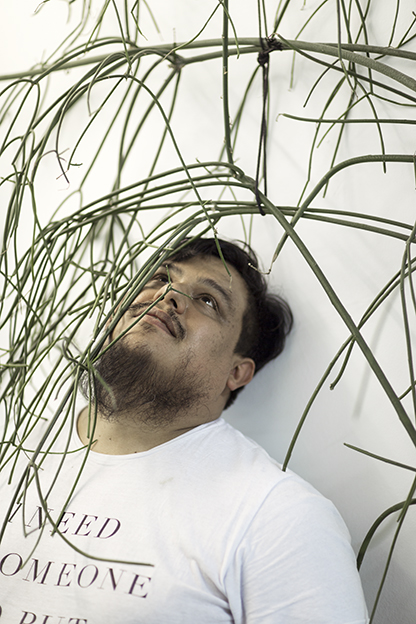 There are several performance artists in Los Angeles that I am inspired by. The two that come to my mind are actually very close friends of mine: Rafael Esparza and Mariel Carranza. They are phenomenal artists. I collaborated with them on the video for »Pearline«. They are both artists who have their very own specific path and vision that they follow. The way they present challenges to themselves and explore different viewpoints of everyday life.
There are several performance artists in Los Angeles that I am inspired by. The two that come to my mind are actually very close friends of mine: Rafael Esparza and Mariel Carranza. They are phenomenal artists. I collaborated with them on the video for »Pearline«. They are both artists who have their very own specific path and vision that they follow. The way they present challenges to themselves and explore different viewpoints of everyday life.
We were wondering if you know Hermann Nitsch. He is an Austrian artist who is well-known for his Orgien Mysterien Theater.
I have heard about that very recently. I think it is phenomenal. I would say it is definitely a testament to the abolishment of limits that you can set to yourself as far as to convey your creativity. A wonderful use of various elements. I greatly admire people who can contextualize aspects that are more associated with a classic style and a perceived notion of what bodies should be used for and present it in a way that pushes the viewer to recontextualize what the human body is capable of. That is certainly a big ignitor of what I do. Taking away the inhibition that people have of their own bodies. And not only embracing the beauty that everybody has individually but exploring what they can do with it regardless of your health or body shape. Just being able to see what you have as a tool, as a precious instrument. I was telling a friend the other day who asked me if I feel vulnerable being nude in a performance, that I feel more nude being clothed. I actually see the vulnerability in other people when they are clothed as well, because to me when you have clothes on, you can see what a person is trying to do to hide their body. And you can see the strategy that goes into that. And there is an industry for that called fashion. You look at yourself in the mirror before you leave the house and you think: This is how I want to present myself. This is how I want to conceal my body. There is a lot of planning, otherwise people would go out naked. But when you are naked in front of people I think you are showing people that there is really nothing that can hurt you. People know that I am fat, I don’t need to put on ten thousand layers of clothing to hide that. But when I take my clothes off, I feel that this is a very special costume for a very special occasion. Like you save your very special dress or suit for a special party. To me this is my special suit underneath. The rest of the time I am covering myself and there is inhibition. But when you eliminate that, it is strength. Nobody can harm you. It is a wonderful thing to be able to say that this is what I was given. I could torment my life endlessly with wanting another body or say: this is actually really great, because it is my unique body. It is a process for me to get there, but I feel I have achieved it more than I ever have.
What role does religion play in your life?
I am a Christian. Religion should be something of the person for the person. It is something that is very personal to me. It should be about the individual. The Roman Catholic Church somehow decided to turn into something else that goes beyond religion, just like any large-scale organization. This is actually separate from religion to me. And my religious believes are separate from what I do creatively. My own spirituality is that I am not always able to explain where the things I create come from. I don’t want to state it as a purely mystical process. Making music is a kind of therapy. And listening to certain types of music brings serenity.
What are your wishes or plans for the future?
To keep creating. It is a gift and a blessing despite everyday hardships of any kind. It makes me feel like the richest person in the world. I hope I can continue to do that on any level. This is my one and only goal.
